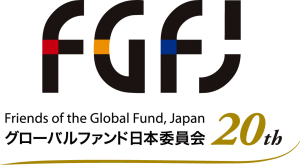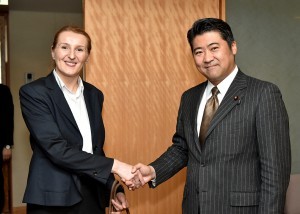Aida Kurtovic, vice chair of the Global Fund, visited Japan on February 3–6. This was her first visit to Japan since her appointment as vice chair. In addition to paying a courtesy call on Prime Minister Shinzo Abe along with other global health professionals, she visited State Minister for Foreign Affairs Seiji Kihara and had discussions with Diet members and senior government officials who support the Global Fund’s activities. She also spoke at the “International Roundtable GGG + Forum 2016: G7 Summit and Global Health Challenges” and was interviewed by the Japanese media about the Global Fund’s activities.
Ms. Kurtovic hails from Bosnia and Herzegovina and has extensive experience in the NGO field working on domestic healthcare service reform, specifically on HIV prevention and improving the lives of people living with HIV. Ms. Kurtovic served as the vice-chair of Bosnia’s Country Coordinating Mechanism which coordinates the development and submission of national requests for funding as well as oversees the implementation of approved grants. With this unique experience, she serves as the vice-chair of the Global Fund. During her visit to Japan, she spoke about the Global Fund’s latest achievements and how the Global Fund has contributed to the strengthening of health systems in the countries that it supports. She also talked about the positive impacts that Global Fund support has to Bosnia. Ms. Kurtovic stressed three points in particular:
1) The Global Fund’s successes
Since its establishment in 2002, the Global Fund has made significant achievements in the fight against the three diseases in cooperation with governments, international organizations and corporations, civil society, and affected persons. By the end of 2014, a total of 17 million lives had been saved through Global Fund-supported programs. Compared with 2004, the number of deaths in 2014 from AIDS, tuberculosis, and malaria had dropped by 40 percent, 29 percent, and 48 percent respectively in countries with Global Fund-supported programs.
2) Contributions to resilient and sustainable health systems
Beyond the fight against the three diseases, the impact of Global Fund-supported programs also extends to health system strengthening. The Global Fund assigns 40 percent of its investments to strengthen health systems. This includes the improvement of healthcare services, information and financial management skills, supply chains, and pharmaceutical management, as well as the training of health workers. Global Fund support greatly contributes to the realization of universal health coverage, which is an important tool in achieving one of Japan’s foreign policy pillars, human security.
3) The Global Fund’s impact in Bosnia
Prior to receiving Global Fund support, Bosnia lacked HIV counseling, testing, and treatment services, as well as medical workers trained to offer these services. Furthermore, men who have sex with men faced harsh discrimination and did not have any organizations that they could go to for support. Now anyone can receive HIV counseling, testing, and treatment. It is estimated that due to Global Fund support, the number of people infected with HIV has remained low at 266 out of a population of 3.5 million, making Bosnia a success story in the fight against AIDS.
4) Expectations for Japan’s leadership
Japan’s leadership in global health was fundamental to the creation of the Global Fund. During the G8 Kyushu-Okinawa Summit in 2000, Japan took up the fight against infectious diseases as one of the summit’s major agenda items, which ultimately led to the birth of the Global Fund. Since then, Japan has contributed $2.35 billion to the Global Fund. As the fifth largest donor country, Japan pledged $800 million at the Global Fund’s fourth replenishment conference in 2013. By December 2015, Japan had contributed $479 million of that amount and an additional $179 million will be disbursed from the 2015 supplementary budget. Health is one of the agenda items at the upcoming G7 Ise-Shima Summit, and Ms. Kurtovic hopes that Japan will fulfill its pledge by disbursing the remaining $142 million during the current replenishment period.


